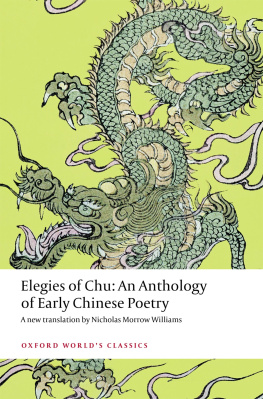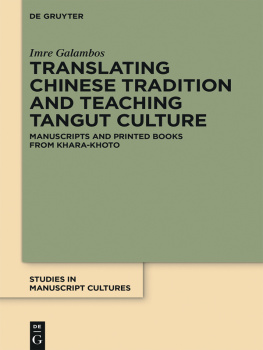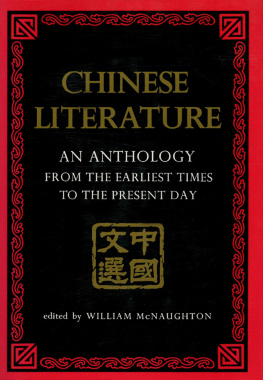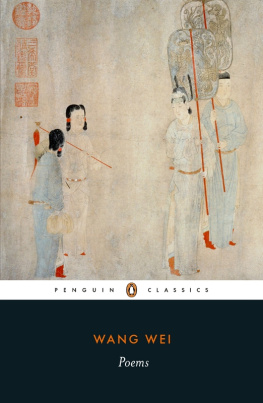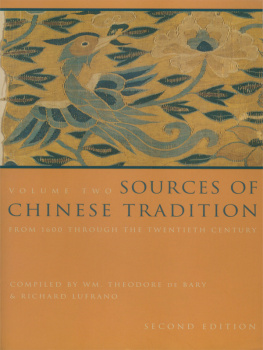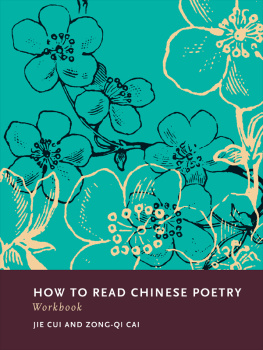elegies of chu (in Chinese, chuci ) is one of the two surviving collections of ancient Chinese poetry, and a source of inspiration for Chinese culture ever since. In spite of its historical importance, though, the anthology remains relatively unknown in the West. The Elegies of Chu, which contains passionate expressions of political protest and also shamanistic themes of magic spells and spirit wandering, has never fitted well within orthodox Confucianism, and as a result has often been excluded from the basic canon of early texts. Even in modern times, the anthology has only been translated once into English in its entirety, and that half a century ago. Precisely because of its unorthodox character, the Elegies of Chu is particularly fascinating to read today. To readers accustomed to thinking of traditional Chinese culture as pragmatic, group-oriented, and materialistic, Elegies of Chu presents a startling counterpoint of shaman-poets, gods and goddesses, mythological journeys, and solitary protest. Along with a select group of ancient prose texts like the Zhuangzi or Classic of Mountains and Seas, it presents an alternative face of early Chinese culture, full of the strange, marvellous, and magical.
Nicholas Morrow Williams is Associate Professor of Chinese literature at Arizona State University and Editor of Tang Studies. He studies and translates classical Chinese poetry in the contexts of comparative literature, Buddhist studies, Sino-Japanese cultural interactions, translation studies, intellectual history, and other fields. His publications include The Residue of Dreams: Selected Poems of Jao Tsung-i and Imitations of the Self: Jiang Yan and Chinese Poetics.
Oxford Worlds Classics
For over 100 years Oxford Worlds Classics have brought
readers closer to the worlds great literature. Now with over 700
titlesfrom the 4,000-year-old myths of Mesopotamia to the
twentieth centurys greatest novelsthe series makes available
lesser-known as well as celebrated writing.
The pocket-sized hardbacks of the early years contained
introductions by Virginia Woolf, T. S. Eliot, Graham Greene,
and other literary figures which enriched the experience of reading.
Today the series is recognized for its fine scholarship and
reliability in texts that span world literature, drama and poetry,
religion, philosophy, and politics. Each edition includes perceptive
commentary and essential background information to meet the
changing needs of readers.

Great Clarendon Street, Oxford, ox 2 6 dp , United Kingdom
Oxford University Press is a department of the University of Oxford. It furthers the Universitys objective of excellence in research, scholarship, and education by publishing worldwide. Oxford is a registered trade mark of Oxford University Press in the UK and in certain other countries
Translation Nicholas Morrow Williams 2022
The moral rights of the author have been asserted
First published as an Oxford Worlds Classics paperback 2022
Impression: 1
All rights reserved. No part of this publication may be reproduced, stored in a retrieval system, or transmitted, in any form or by any means, without the prior permission in writing of Oxford University Press, or as expressly permitted by law, by licence or under terms agreed with the appropriate reprographics rights organization. Enquiries concerning reproduction outside the scope of the above should be sent to the Rights Department, Oxford University Press, at the address above
You must not circulate this work in any other form and you must impose this same condition on any acquirer
Published in the United States of America by Oxford University Press
198 Madison Avenue, New York, NY 10016, United States of America
British Library Cataloguing in Publication Data
Data available
Library of Congress Control Number: 2021950970
ISBN 9780198818311
ebook ISBN 9780192550446
Printed and bound in Great Britain by
Clays Ltd, Elcograf S.p.A.
Acknowledgements
Paul Kroll first suggested that I tackle the anthology and inspired me through his own iridescent translations of Chinese poetry, not to mention his now-indispensable dictionary. David Knechtges has for two decades been my model for rigorous attention to Chinese texts and their entire historical contexts. I would like to thank my many students and friends in Hong Kong for their patient and wise corrections. Above all I am grateful to my late father, who read this volume in draft, and encouraged me at every turn of the meandering journey that has somehow led me into the wilderness of Chu.
Contents
The anthology Elegies of Chu (Chuci) is one of the earliest collections of Chinese poetry, compiled in the second century ce , and a touchstone of Chinese culture ever since. While other ancient Chinese classics are dedicated to achieving political harmony or to recounting historical events, the poems compiled in the Elegies offer voices of protest, private frustration, and otherworldly longings. The vivid symbolism of the poems is drawn from the natural landscapes of southern China, while the spiritual journeys and dreams of immortality are inspired by local religious rites as well. The Elegies of Chu thus offers an enlightening perspective on ancient China that is often at odds with the orthodox political tradition that later prevailed.
The fundamental background of the anthology is that of the Zhou dynasty (1045221 bce ), the long period when much of Chinas culture was established. But the unique literary and spiritual features of the anthology are distinctively tied to the specific cultural milieu of the southern state of Chu, an independent kingdom until the 3rd century bce , as well as the Han dynasty (206 bce 220 ce ) when the text of the anthology as a whole was established. Indeed, the most remarkable thing about the anthology as a whole may be its synthesis of these various origins, beginning with the inspiring legends and governing models of the Zhou; taking flight from Chu with its reverence for magic and spirits unusual in the orthodox culture of premodern China; and ultimately coalescing under the sophisticated bureaucracy of the Han empire.
The Worlds of Ancient Zhou, Chu, and Han
In approximately the year 1045 bce , King Wu defeated the ruling dynasty of Shang to establish the Zhou dynasty, with its capital near the modern city of Xian in Shaanxi province. Though the historical sources for the early Zhou are limited, its governing institutions and doctrines have been inspirations and models for Chinese culture ever since. In particular, the Zhou victory was said to have moral implications, proving the Zhou regime to be vindicated by the mandate of Heaven itself. King Wu and his father, posthumously awarded the title King Wen, were seen not just as effective leaders but also as models of virtue. One of their most prominent virtues was said to be their appreciation of merit even in unlikely candidates, such as the hero L Wang, formerly a butcher in the Shang capital, but later a keen minister to both Kings Wen and Wu. L Wang is praised by name already in the first poem in the Elegies, the Li sao, where we read that while he was brandishing a butchers knifehe found his true mtier by meeting King Wen of Zhou.

